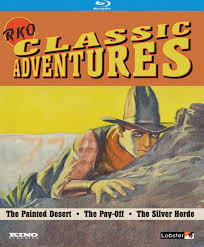RKO Classic Adventures Collection (The Pay-Off / The Silver Horde / The Painted Desert)
Directors– Howard Higgin, Lowell Sherman, George Archainbaud
Starring – William Boyd, Lowell Sherman, Evelyn Brent, Helen Twelvetrees, Marian Nixon
Country of Origin- U.S.
Distributor - Kino Lorber
Number of discs – 1
Reviewed by - David Steigman
Date- 06/20/2019

One thing I really like about Kino Lorber is their occasional release of some obscure early talkie pre-code films from the early thirties. Just recently, Kino unearthed two Blu-ray collections from the RKO library featuring some early works of many legendary Hollywood stars. One collection features films with a romance theme, while the other one which this review covers is a trilogy of classic adventure films, entitled RKO Classic Adventures Collection. The three films in this set are The Painted Desert, The Pay-Off and The Silver Horde.
The Painted Desert is the story of two cowboy friends, Jeff (J. Farrell MacDonald) and Cash (William Farnum) who find an abandoned baby in a covered wagon. The two argue who should be the one to raise the baby. Cash ends up with parental control of the baby, which for some reason makes them bitter enemies. The baby grows up into Bill Holbrook (William Boyd) who helps Cash on his ranch while Jeff, still disgruntled lives with his grown daughter Mary Ellen (Helen Twelvetrees) in the same area where he found the abandoned baby. Now as an adult, Bill has tried to get the two former friends to reconcile their differences, but nothing doing. Rance Brett (Clark Gable) then enters the scene and is able to manipulate and increase the hatred between Jeff and Cash by sabotaging a mining operation. Rance is able to convince Jeff that Cash was responsible for blowing up the mine. His motivation for creating all of this drama is because of his jealousy toward Bill who plans to marry Mary Ellen. Rance had taken a liking to Mary Ellen, but when he learned she was going to marry Bill, his animosity got the better of him and did what he could to sabotage their plans. Nice guy!
The Painted Desert is a decent Western, and it is more or less a weekend matinee fodder kind of movie. It’s not the most exciting Western that you will ever watch but the film has a strong story and characters that should hold your interest. The lack of music also gives the movie some atmosphere. The film unfortunately has way below average acting, save for Clark Gable, in his first talkie film, who steals the show. Line delivery was not the best aspect of the movie. Clark Gable’s presence was, thankfully and saved the film from being a tedious watch. Speaking of Clark Gable, at the time this movie was made, he didnt know how to ride a horse! Another positive aspect of the picture is Edward Synder’s cinematography capturing some great Arizona scenery where majority of the film was shot.
The next feature, from 1930, The Pay-Off is about two poor young adults Nancy Porter (Marian Nixon) and Tommy Brown (William Janney) who are robbed by a professional gangster named Rocky (Hugh Trevor), stealing their wedding money, and seek revenge against him. Tommy botches his robbery attempt on Rocky to get his money back. Gene Fenmore (Lowell Sherman, the director himself), the leader of the gang which Rocky is a part of, actually gives the kids their money back. He then takes the two kids under his wing and looks after them. Rocky, the bad apple of the gang and wants to break away from Fenmore, sets Nancy and Tommy up during a heist where he shoots and kills the owner of jewelry store, and framing the couple in the process. This leads to a gunfight struggle between Rocky and Fenmore followed by a visit to the DA’s office with the hopes to set the young lovers free.
The Pay-Off , I felt was a really good classic picture, with some superb acting by the cast, especially Marian Nixon and William Janney in the roles of the young na´ve innocent kids. Their facial expressions along with their dialog made the film all the better. Another great aspect about the film as was the case with The Painted Desert is the lack of music which also gives the film some extra atmosphere. Lack of music actually does improve some pictures, adding more to the film.
The Silver Horde , the third feature of this set, is pre-code romantic love-triangle drama film directed by George Archainbaud about a fisherman Boyd Emerson (Joel McCrea) who is torn between two women, Cherry Malotte (Evelyn Brent) and Mildred Wayland (Jean Arthur). Cherry has a troubled past as she was a former prostitute turned businesswoman, while Mildred is more of a ‘decent’ woman who is heavily involved in the fishing industry. Both of them are vying for Boyd’s heart with one of them trying to do it by financing his fishing business. Boyd’s heart originally was with Cherry until he finds out that she was a prostitute, which gives him second thoughts. In between his decision as to which woman he will spend the rest of his life with, Boyd is also in competition with other fisherman to catch and sell as much salmon as possible with his competitors trying to sabotage his fishing operation. And yes, Cherry while has a “fishy” past, Boyd looks deeper into her character, and how he feels when he’s around her versus Mildred who is a bit on the snobby side.
The Silver Horde is great drama film with two actors who would become bigger stars, Joel McCrea and Jean Arthur. This was Joel McCrea’s twelfth film but only the fourth that he was credited for and would go on to bigger films such as Foreign Correspondent and later moving on to Westerns, while Jean Arthur would either star in middle-tier films or a have a supporting role in several A-list movies; among them are Mr. Smith Goes to Washington, Only Angels Have Wings and You Can’t Take it With You. The remaining cast, including top-billed Evelyn Brent, all hand in excellent performances, with Brent seriously outperforming Jean Arthur. The two ladies have a great scene together during an argument over Boyd with some amazing dialog from Brent. Louis Wolheim is another actor who is great in his supporting role as George Balt and is a scene stealer. The cinematography is especially terrific here, with Leo Tover and John W. Boyle capturing the beautiful snowy Alaskan locations. Watch for the intriguing scene of the process how fresh salmon winds up being canned!
Kino Lorber, under the Kino Classics umbrella, presents all three films on Blu-ray with the restoration done by Lobster Films. All three films are on one Blu-ray disc, most likely because of the short running time for all three films. The Painted Desert looks stunning; the image quality is nothing short of a revelation with its clarity and sharpness. Despite the usual speckles, vertical lines and some print damages that appear here and there, overall this is polished, clear image with a balanced greyscale. It looks remarkably good for such an obscurity!
The same can be said for The Pay-Off, which also boasts a smooth, polished transfer. It’s a clean black and white image with excellent contrast. Even though there are a few sequences with some print damage and some wear, particularly during the 45 minute mark, the video quality of The Pay-Off is something of a revelation and easily blows away the DVD releases.
The Silver Horde doesn’t fair as well in the video department with a vast amount of print damages, speckles, and vertical lines appear throughout. The image is clear but often looking a bit on soft side. Of the three films on this collection, this one, while not terrible, is still the least attractive. The final half hour is when the image shines a bit better and overall it is more than serviceable. It is possible given more time and a stronger effort, it could have looked even better. But that is just speculation.
The audio for this release for all three films is English DTS-HD master audio 2.0, pretty much the Kino Lorber standard. In the case of The Painted Desert and The Pay-Off, the audio does sound clear without any noticeable drop-offs, hissing or serious defects. Unfortunately, The Silver Horde as was the case for video quality also doesn’t fare as well as the audio department as the dialogue is at certain points sound muffled or scratchy. That being said, the audio easily bests the DVD offerings out there. It’s really too bad because one can argue The Silver Horde is the best film of the three in this collection.
For those who love extras, sadly there are no extras to be found in this offering. This is a release that fans of these films should just be glad a label took the time to present them on Blu-ray.
The RKO Classic Adventures Collection is a recommended set, despite a few shortcomings and hiccups with the audio and video, the presentations are 100 times better than those public domain DVD releases making the viewing experience 100% better. The films themselves are highly enjoyable. Hopefully, there will be more releases like this from Kino down the road.






